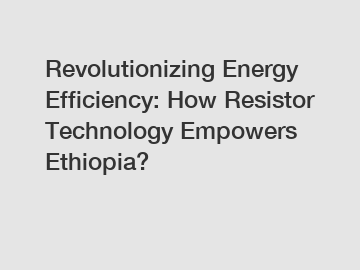Revolutionizing Energy Efficiency: How Resistor Technology Empowers Ethiopia?
Revolutionizing Energy Efficiency: How Resistor Technology Empowers Ethiopia?
In a world grappling with climate change and an increasing demand for sustainable energy solutions, the quest to revolutionize energy efficiency has become paramount. Among the many nations striving to meet these challenges head-on, Ethiopia has emerged as a trailblazer in harnessing innovative resistor technology to empower its people and transform its energy landscape. This article delves into the ways in which resistor technology is being leveraged to fuel Ethiopia's journey towards a greener and more sustainable future.
1. Unlocking the Potential of Renewable Energy:

With its abundant natural resources, Ethiopia has a significant potential to generate renewable energy. Resistor technology plays a crucial role in enabling the efficient utilization of these resources. By integrating resistors into power generation systems, Ethiopia can achieve better control and regulation over energy output, ensuring optimal functioning and reducing wastage. This not only enhances the overall efficiency and reliability of renewable energy sources but also paves the way for increased adoption and expansion of such systems.
2. Mitigating Energy Losses and Enhancing Grid Stability:
One of the foremost challenges faced by developing nations like Ethiopia is the transmission and distribution losses within their energy grids. Resistor technology aids in minimizing these losses by effectively regulating the flow of electrical currents. By strategically placing resistors at critical points within the grid infrastructure, Ethiopia can significantly reduce energy wastage, bolster grid stability, and improve overall energy efficiency. This, in turn, makes energy more accessible and affordable for its citizens.
3. Empowering Rural Communities with Microgrids:
In many rural areas of Ethiopia, access to reliable electricity is limited or non-existent. Resistor technology offers an innovative solution through the implementation of microgrids, localized power generation and distribution systems. These microgrids, equipped with resistors, allow communities to generate renewable energy from nearby sources such as solar or wind, and efficiently distribute it among households and businesses. By embracing this technology, Ethiopia can bridge the energy gap between urban and rural areas, bringing light and power to remote communities.
4. Enabling Energy-Efficient Industrialization:
As Ethiopia strives to develop its industrial sector, energy-intensive industries often place a significant burden on existing power infrastructure. Resistor technology can play a pivotal role in optimizing energy consumption within these industries. By integrating innovative resistor-based control systems, industrial processes can be fine-tuned to minimize energy waste and maximize efficiency. This not only reduces the strain on the national power grid but also helps industries become more economically viable and environmentally sustainable.
In conclusion, the revolutionizing potential of resistor technology in empowering Ethiopia's energy sector is undeniable. By embracing this technology, the nation can unlock the vast potential of renewable energy sources, mitigate energy losses, and enhance grid stability. Moreover, resistor-enabled microgrids can bring reliable electricity to rural communities, fostering socioeconomic development and improving quality of life. Lastly, energy-efficient industrialization powered by resistor technology can pave the way for sustainable economic growth. As Ethiopia continues to make remarkable strides in its pursuit of energy efficiency, resistor technology stands as a key enabler of its transformative journey towards a greener and more sustainable future.
Contact us to discuss your requirements of film type resistor, glass resistor, resistor manufacturing factory. Our experienced sales team can help you identify the options that best suit your needs.
267
0
0

Comments
All Comments (0)